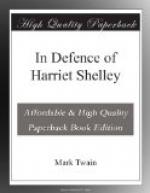But we have said enough about the head of the new paradise. Mrs. Godwin is described as being in several ways a terror; and even when her soul was in repose she wore green spectacles. But I suspect that her main unattractiveness was born of the fact that she wrote the letters that are out in the appendix-basket in the back yard—letters which are an outrage and wholly untrustworthy, for they say some kind things about poor Harriet and tell some disagreeable truths about her husband; and these things make the fabulist grit his teeth a good deal.
Next we have Fanny Godwin—a Godwin by courtesy only; she was Mrs. Godwin’s natural daughter by a former friend. She was a sweet and winning girl, but she presently wearied of the Godwin paradise, and poisoned herself.
Last in the list is Jane (or Claire, as she preferred to call herself) Clairmont, daughter of Mrs. Godwin by a former marriage. She was very young and pretty and accommodating, and always ready to do what she could to make things pleasant. After Shelley ran off with her part-sister Mary, she became the guest of the pair, and contributed a natural child to their nursery—Allegra. Lord Byron was the father.
We have named the several members and advantages of the new paradise in Skinner Street, with its crazy book-shop underneath. Shelley was all right now, this was a better place than the other; more variety anyway, and more different kinds of fragrance. One could turn out poetry here without any trouble at all.
The way the new love-match came about was this:
Shelley told Mary all his aggravations and sorrows and griefs, and about the wet-nurse and the bonnetshop and the surgeon and the carriage, and the sister-in-law that blocked the London game, and about Cornelia and her mamma, and how they had turned him out of the house after making so much of him; and how he had deserted Harriet and then Harriet had deserted him, and how the reconciliation was working along and Harriet getting




